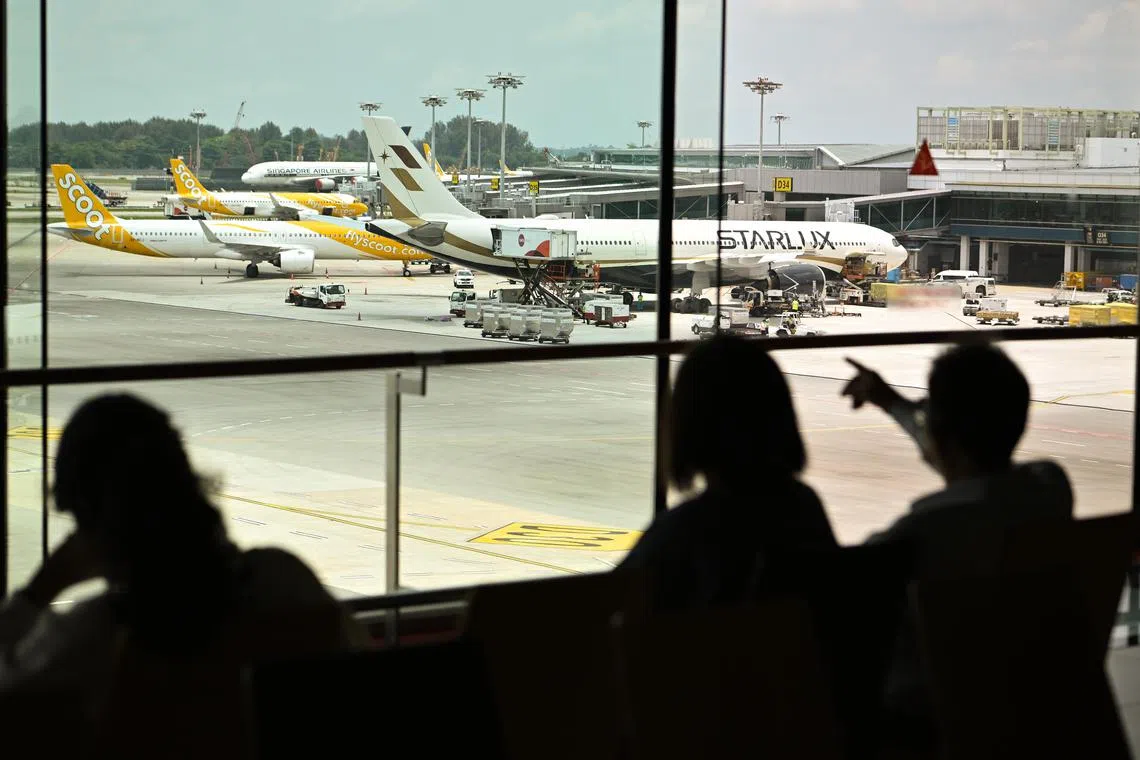Sustainable aviation fuel production to triple in 2024, but industry still some way from 2030 goal
Sign up now: Get ST's newsletters delivered to your inbox

About 17.5 billion litres of eco-friendly fuel - more than nine times the projected amount in 2024 - will need to be produced yearly by 2030, said Iata.
ST PHOTO: LIM YAOHUI
Follow topic:
GENEVA – The production of eco-friendly jet fuel is expected to triple to 1.875 billion litres in 2024, accounting for 0.53 per cent of the aviation industry’s fuel needs, said the International Air Transport Association (Iata).
But this is still far behind the amount needed to reach the target of having cleaner jet fuel form 5 per cent of fuel consumption by 2030.
That is because to meet this target, about 17.5 billion litres of eco-friendly fuel – more than nine times the projected amount in 2024 – will need to be produced yearly by 2030, Iata said at its global media day on Dec 6 in Geneva, Switzerland.
In 2023, greener jet fuel volumes reached 600 million litres, double the 300 million litres produced in 2022, said Iata.
Sustainable aviation fuel refers to jet fuel made from waste materials such as used cooking oil and animal fat.
Singapore Airlines and its budget arm Scoot are among those committed to reaching a goal of 5 per cent sustainable aviation fuel use by 2030.
In November, the International Civil Aviation Organisation and its member states – including Singapore – adopted a global framework for cleaner aviation fuels to reduce carbon emissions in international aviation by 5 per cent by 2030.
Also in November, Singapore’s Acting Transport Minister Chee Hong Tat emphasised the importance of looking for greener ways to run airline operations through the use of eco-friendly fuel
The Singapore Government has been considering imposing rules either mandating or incentivising the use of sustainable aviation fuel for flights departing Singapore.
This will form part of Singapore’s Sustainable Air Hub Blueprint
Reiterating the need for a global sustainable aviation fuel accounting system and registry, Iata’s senior vice-president for sustainability and chief economist Marie Owens Thomsen said this would incentivise more airlines to switch to renewable jet fuel as they will be able to bank on the environmental benefits from alternative fuel use to meet their decarbonisation obligations.
She added that this would help to scale up the process and encourage all airlines, not just those located in regions that produce such fuel, to adopt the use of eco-friendly fuel.
To reach the global target of 5 per cent sustainable aviation fuel use by 2030, much more needs to be done, said Iata.
Dr Thomsen noted that in 2022, the oil and gas industry invested only US$20 billion (S$26.8 billion), or less than 3 per cent of its budget, into developing new renewable energy technologies.
For the aviation industry to undergo an energy transition, the oil and gas industry would need to increase its annual renewable energy investments to US$150 billion, or 19 per cent of its budget, she said.
Iata director of net-zero transition Hemant Mistry said governments should work closely with the sustainable aviation fuel industry to support technological development and increase funding for production, instead of just imposing mandates that do not guarantee improvements in production volumes.
Mr Mistry added that the regional diversification of feedstock – raw materials such as plant oils and agricultural waste that can be used to produce fuel – is important, as this will allow the industry to leverage local feedstock unique to different regions to increase production of eco-friendly fuel.
Iata said the demand from airlines for sustainable fuel vastly exceeds its availability now.
This situation will persist for the foreseeable future, noted Dr Thomsen.
According to a recent Iata survey, 86 per cent of the 6,500 travellers polled agreed that governments should provide production incentives for airlines to use such fuel, while 86 per cent also believed it should be a priority for oil companies to supply eco-friendly jet fuel to airlines.
At its global media day, Iata leaders presented other ideas on topics pertinent to the industry, such as biometric technologies, aircraft noise management and sustainability efforts in the air cargo sector.
On biometric technologies, Iata said it has been working with airlines, airports and government partners to create a seamless check-in and immigration process for travellers through the use of digital biometric identities in which a user’s credentials can be verified and accessed via smartphones.
The association plans to continue trialling its digital identity initiative, One ID, in 2024. It aims to eliminate the need for passengers to present different travel documents to many parties during their travels.
The association also touched on the importance of adopting a balanced approach to tackling the problem of aircraft noise by reducing noise at the source, using effective land-use planning methods to ensure enough distance between airports and people, as well as imposing noise-level limits and night air-traffic curfews.
To promote sustainability in air cargo, Iata is prioritising the sector’s 2050 net-zero commitments.
The aim is for the industry to reduce single-use plastics, such as for plastic wraps and tape packaging, and perishable loss – for time- and temperature-sensitive goods such as fruit, batteries and pharmaceuticals – in air cargo operations.

